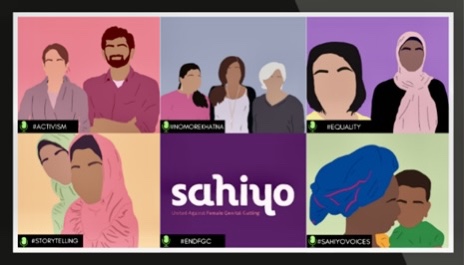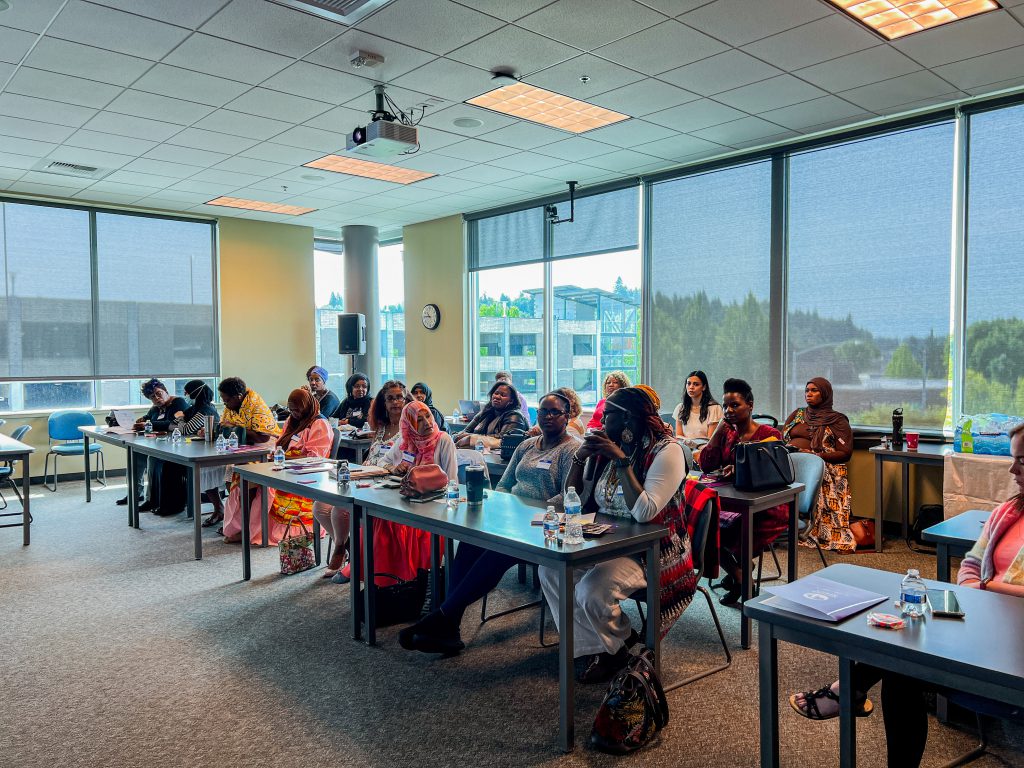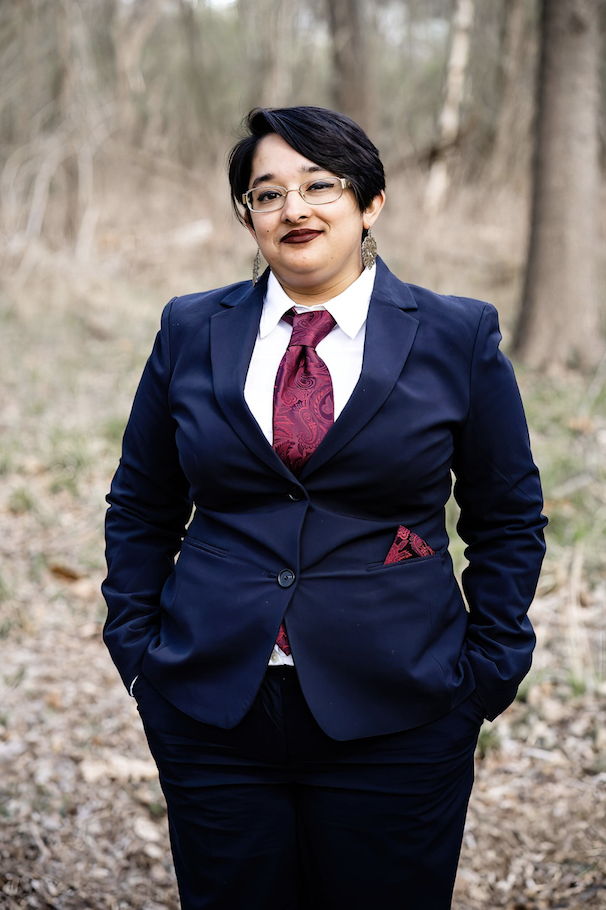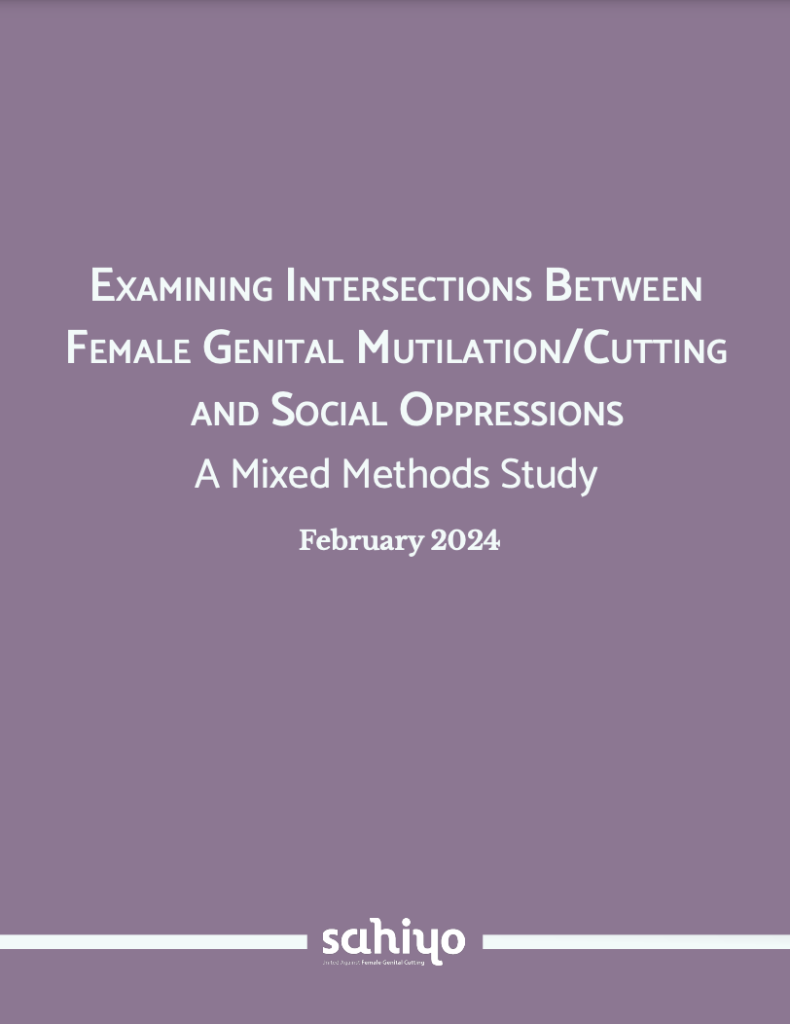Announcing a New Website for FGM/C Prevention & Response Project in Washington State!

Sahiyo U.S. and partners of the FGM/C Prevention & Response in Washington State project are thrilled to announce the launch of wafgmc.com, the new comprehensive resource hub for the project! This website is designed to provide essential information and updates on our initiatives in Washington (WA). On the site, you’ll find valuable educational resources, information on the legislative history of FGM/C in WA, and opportunities to get involved with the project. Designed to support professionals, community members, and survivors, this site ensures accessibility and engagement for all, with translation options available in various languages (such as Arabic, Spanish, French, and more). Lastly, take some time to visit our page on upcoming training opportunities. Here, you can find details about training sessions that Sahiyo U.S. and project partner the U.S. End FGM/C Network, are planning to host over the next year on various topics related to FGM/C prevention and response. You can also request a specialized training by completing the request form to hold an in-person or virtual training for your group or organization. For more information please visit wafgmc.com.
Reflecting on Sahiyo’s 2024 Activists Retreat

This past July, Sahiyo hosted its eighth annual Activists Retreat virtually, welcoming activists and individuals belonging to FGC-practicing communities to discuss the impact of this harmful practice in a safe and inclusive space. Typically, this program is exclusive to activists and members in the South Asian Bohra community. However, this year’s retreat piloted an inclusive approach, welcoming 14 participants from Asian Pacific Islander (API) and Southwest Asian and North African (SWANA) regions. Each participant enriched the discussions and workshops by sharing their unique experiences in anti-FGC advocacy, benefiting everyone at the retreat. The three-day virtual retreat included an agenda packed with educational programs, self-care activities, and discussion sessions for activists to reflect on their activities together as a community. Shivangi Misra, a global legal advisor from Equality Now, was a featured speaker during the retreat who presented on the “Legal Landscape of FGM/C in the U.S. Context.” Araya Casey, from the award-winning nonprofit organization, Free2Luv, conducted an art workshop tailored to the unique experiences of activists and survivors of FGC. Activists also participated in an action planning session, which offered an opportunity for activists to discuss short-term and long-term advocacy goals, as well as reflect on recent accomplishments from past retreat participants. With the virtual retreat successfully concluded, planning is now underway for the in-person, Bohra-focused retreat scheduled for early 2025. Apply to the 2025 in-person Activists Retreat! For additional details about the retreat and eligibility, visit the Activists Retreat page or email our Community Engagement Coordinator at samman@sahiyo.org.
Sahiyo in D.C.! Key Insights from Our In-Person Meeting with DOJ OVW Partners

Earlier this year, we were honored to join forces with the Milken Institute School of Public Health, the U.S. End FGM/C Network, and the Global Woman PEACE Foundation (GWPF) to address FGC across the United States. This initiative, funded by a $300,000 grant from the Department of Justice’s Office on Violence Against Women (DOJ-OVW), marks a significant step forward in our fight to end FGC. Throughout this project, our dedicated team will conduct listening sessions, offer comprehensive training and technical assistance (T&TA), and develop online resources to enhance the capacity of state agency partners and community service providers in supporting FGC survivors. This initiative represents a significant milestone in our ongoing efforts to create a safer and more supportive environment for impacted individuals. On June 20, 2024, we hosted an impactful in-person meeting at George Washington University with our project partners. This gathering allowed us to review the project timeline in great depth and align on progress and upcoming milestones. A highlight of the meeting was reviewing the data we have collected thus far from the listening sessions, which provided invaluable insights into the knowledge, strengths, and needs of the grantees regarding FGC awareness and understanding. This data-driven approach initiated rich discussions and brainstorming sessions among the partners, emphasizing the importance of organizing our T&TA as a learning collaborative. We explored ideas for creating a toolkit of case studies and guided sessions by subject matter experts to facilitate peer learning. Our goal is to build a framework for ongoing support and capacity building in FGC prevention and response, recognizing that this is a journey we undertake together, pioneering new efforts and approaches in addressing FGC. We look forward to sharing some of our recent findings with federal agencies in a meeting later this month. Our goal is to inspire and advocate for additional federal funding and support for these efforts nationwide, recognizing that our strength lies in our collective commitment and collaboration.
Paving the Path to End FGC in Washington State! Year 1 in Review

We’re excited to share the highlights of an incredible journey we’ve embarked on with our partners Mother Africa, The U.S. End FGM/C Network, and the Washington State Department of Health. Our collective mission to prevent and respond to female genital cutting (FGC) across Washington State has seen tremendous progress since Year 1 began this past March, thanks to the enthusiastic support and participation of our community members. From the very beginning, with the Washington Coalition championing the law against FGC that eventually passed in April 2023, engaging with our communities has been at the heart of our efforts. In Year 1, our outreach activities brought together over 100 individuals, creating spaces for meaningful conversations and shared learning. Through a series of informative events, including an FGC 101 training and thought-provoking webinars, we have not only spread awareness but also sparked important discussions. During this period, two of our meetings were hosted in-person in Kent, WA, inviting community members to get involved with the project and learn more about FGC. The first meeting held in April 2024, was the kick-off event for this initiative and involved various strategy sessions. Attendees collaborated in resource mapping exercises, identifying key players for our advisory committee and brainstorming innovative programming ideas. The energy and excitement in the room for this project were palpable as attendees shared their insights and built connections with individuals in their nearby communities. This event not only laid the groundwork for our project’s future activities but also exemplified our commitment to community-driven solutions and inclusive dialogue. The final in-person meeting for the year was hosted on June 13th, and included a screening session of videos from Sahiyo’s Voices to End FGM/C project titled, “Video Screening & Discussion with Survivors of FGM/C in Washington State.” This event was particularly moving, as two of the storytellers themselves were present and participated in a panel discussion answering questions about their experiences, insights, and what they are looking forward to with this project. These moments of connection remind us of the importance of community-led initiatives and the power of storytelling in fostering understanding and empathy. As we look forward to Year 2, we are filled with hope and determination! To learn more visit the project’s website and watch the Year 1 below: [youtube url=”https://www.youtube.com/watch?v=BaPL70v6LjE”]
That Old Familiar Violence – Reflecting on AAS 2024

By Umme Kulsoom Arif Seattle, Washington. March 15, 2024. 9:00AM. The presentation room is small and its audience even smaller, with just about six or seven seated in a space meant to fit thirty listeners. I count myself as apart from them, seated nervously at the front of the room with my fellow panelists and professors all with fascinating and powerful subjects of interest — true scholars, honored in academia, years of experience and dedicated research behind them. And then there’s me — an interloper. Existing on the outskirts of spaces is not an unfamiliar feeling to me. At the 2024 Association for Asian Studies Conference, I was a non-academic, a formerly practicing attorney now working at a university as an academic counselor. This may have been fine to me, were I a mere attendee, a voyeur on the outside of the conversation, observing and learning. Barely noticed, but not enough to be spoken to. Unfortunately for me and my imposter syndrome, I had a paper to present. I chose to write Boxed-In: Considering the Impact of FGM/C on Queerness and Sexuality in the South Asian Diaspora in America as a scholarly personal narrative because — in truth — I wasn’t sure what Queer perspectives were out there for FGM/C survivors and did not have the emotional courage to put out a call for voices. I was familiar with activist artist and writer Dena Igusti, whose work and open existence as a non-binary survivor was what gave me the courage to attach non-binary to myself and my survivor status, and though our experiences mirrored each other, I found myself struggling to find academic research surrounding what it meant to be the victim of a very gendered act while simultaneously wanting to reject being seen as that gender. FGM/C happened to me because someone else decided I was a woman long before I was old enough to understand what womanhood and girlhood meant, much less able to process what it meant for me. As a result of it, I will always be associated with my “dead” womanhood, further denied my agency and reminded of such every time “she” and “her” are used in association with me. Therefore, selfishly, I wrote my paper to reclaim my identity and make myself whole. It sort of worked. The day before our scheduled panel presentation, as we rehearsed our various speeches, I corrected the panel moderator — my speaker bio had “they” and “their” in it, instead of “she” and “her” — and then stood to practice my speech before my fellow speakers. I anticipated it — strict adherence to (incorrect, outdated, prescriptivist, cruel) “rules” of grammar pretend that the singular “they” is an impossibility in English — but anticipation certainly doesn’t stop that low-grade invalidation from hurting. My speech even called this out, promising, “I can even guarantee you this — once you leave this room, once I am done talking — you will forget. You will perceive me — surrounded by the trappings of my assigned womanhood — and you will forget. So you will fall back on that old familiar violence — she and her.” I was right. The day of the presentation, my speaker biography is read aloud and — despite the words they and their written on the page — she and her pour out from the moderator presenting me. Looking back, I imagine the audience saw me wince before I began speaking. Dena Igusti called this experience — this perpetual association with cis-womanhood — a “quiet violence.” They aren’t wrong. As a non-binary survivor, I have to weigh my physical safety every time I enter a survivor space, or engage in anti-FGM/C activism. Will my identity be respected? Will gender-affirming care once more be equated to FGM/C, forcing me to out myself in non-affirming company in an effort to defend the rest of my trans and non-binary community? Will the push to ban FGM/C on the state level be co-opted by hate the way it nearly has been in Texas through bills like SB249 or similar bills in many other states? On some level, this feels intentional. In survivor spaces, womanhood is elevated because of FGM/C’s attack on it. My imposition in these spaces is allowed as a courtesy, and I reluctantly accept “she” as a courtesy in return, accepting the violence that erases my identity in an effort to receive solidarity and support for the violence that granted me it. At the conference, I am both unable and unwilling to make this concession. Accustomed to butchery as I am, I speak to a teary-eyed audience of the ways I — as an example of non-binary survivorship, should more than I exist — carve my many identities into pieces to make myself more palatable to the disparate communities I am desperate to belong to. I call out this indifference to queer survivorship — likely the reason so few exist publicly, unable to comfortably come out and seek necessary support — and the way the movement to end FGM/C quietly includes trans-exclusionary voices, both because TERFs (defined by Oxford Languages as: a person whose views on gender identity are considered hostile to transgender people, or who opposes social and political policies designed to be inclusive of transgender people.) love to co-opt the term “genital mutilation” to make the case against gender-affirming care and because the inherent attack on womanhood that is FGM/C leads to many forgetting that those who don’t identify as women can still be victimized. Make no mistake — I am grateful for the opportunity to attend the AAS Conference and the support given by Sahiyo to make that possible. I am grateful for the opportunity to speak and make even the slightest effort at raising awareness and using storytelling as activism. That does not erase the profound loneliness and struggle of being a minority within a minority, double-marginalized and forced to choose between identity and activism. It can be annoying. I get it. Being publicly corrected, interrupted mid-thought
Impactful Media Reporting on Female Genital Mutilation/Cutting in the United States: A Reflection on our April 17, 2024 Webinar
By Megan Seaver On April 17th, Sahiyo U.S and Equality Now had the honor of hosting a virtual event, “Impactful Media Reporting on Female Genital Mutilation/Cutting in the United States: A Conversation.” This webinar explored how to report on female genital mutilation/cutting (FGM/C) in a culturally cognizant, gender-sensitive, and ethical way. Attendees were media and communications professionals. Speakers included a panel of media and advocacy experts, such as: Washington State Senator Karen Kaiser, Emma Batha of Thomson Reuters Foundation News, Journalist Milena Mikael Debass, and documentary filmmaker Milena Warns from Without Exception Films. The moderators were Sahiyo Co-founder and U.S. Executive Director, Mariya Taher, and Equality Now Communications Officer for North America, Mel Bailey. Through this conversation, attendees were better able to understand the prevalence and complexity of FGM/C within the U.S. and the importance of engaging with survivors in a considerate manner when reporting on FGM/C. Additionally, attendees gained strategies on how to use media platforms to raise awareness and educate the public on FGM/C. They also learned analytical tools for covering related news, such as legal developments and community advocacy efforts effectively. Here are some highlights from webinar attendees: The importance of building relationships with survivors: “I can’t stress enough how important it is to build those contacts with survivors because that is how you get stories. When I meet advocates, or survivors I like to spend quite a lot of time with them, and meet them in person, because even if that interaction does not lead to a story you’re still increasing your knowledge which makes for better reporting and also builds trust so that the survivor or organization better understands what you as the report are seeking from the interaction” – Emma Batha The impact of a comprehensive approach and the role the media plays in it: “We are here to talk about media in all its forms and the roles that media can play when it comes to having a multi-sectoral approach to end FGM/C. Multi-sectoral means the collective effort of government agencies [and] local organizations, provides FGM/C education builds awareness, as well as support services for survivors at the federal, state, and local levels, to end FGM/C.” – Mariya Taher How media can tackle misinformation: “It takes a lot of education, and the media is a part of that process because people have a lot of misinformation. Unfortunately, we had to clarify that this practice is not religious practice… so it was somewhat of a difficult communications project and I have to give credit to the Washington coalition for providing first-person testimony to correct, and educate and to elucidate this issue.” – Senator Karen Kaiser On Survivor-led initiatives: “I wanted to write something that highlighted survivor-lead efforts to end the practice in the U.S. Figuring out how to show that work through videos took time, to build relationships, and how to make it visual. I had several conversations with Mariya, always kind of thinking about what types of work I could highlight. By the end, I was able to interview three survivor activists, but also film the Activist Retreat which is put on by Sahiyo in New York, [as well as help a D.C.survivors support group for African women, and a training for law enforcement on how to look for signs of FGM/C taking place in their community.” – Milena Mikael Debass Bring the issue of FGM/C to a wider audience: “We have a docu-series that focuses on different issues women face around the world and FGM/C is one of those. The one thing I keep coming back to is that we don’t give people enough credit. People want to learn about this, myself included. When we were going to film in different parts of the world, I spoke to my friends about this project and they wanted to know more about it. Then when we included the celebrity component we interviewed Constance Wu, an actress in Crazy Rich Asians who personally chose to discuss this topic because she personally wanted to learn about it.” – Milena Warns To learn more about this event, watch the recording below: [youtube url=”https://www.youtube.com/watch?v=oJsW0Ll024I”] Learn more about media communication/reporting on FGM/C with the resources below: Sahiyo survivor stories – Sahiyo Resource Guide for Sensitive and Effective Reporting on FGM/C – Sahiyo Global FGM media reporting toolkit – Equality Now US FGM media factsheet – Equality Now US FGM State Law Map – Equality Now
Headline: Understanding the Critical Intersections of FGM/C with other social injustices: Encouraging dialogue on cross-movement collaboration

In April, Sahiyo’s research team gave two presentations exploring data from our advocate and survivor-led Critical Intersections Research Project, the latest report from this project having been released in February 2024. On April 23rd, Sahiyo presented Critical Intersections of FGM/C: The Value of Intersectionality in Cross-Collaboration in conjunction with API-GBV to attendees belonging to various gender-based violence organizations. This presentation fostered lively conversations around intersectionality and cross-collaboration, with one attendee asking about potential collaborations between the anti-FGM/C sphere and those working to end human trafficking. Overall, attendees reflected upon the interconnectedness of their various foci according to intersectionality. The second presentation, on April 24th, was in collaboration with the World Bank Group’s FGM Legal Working Group. Critical Intersections of FGM/C: Law and Policy in Systems of Oppression found attendees drawing on their current work, and how to interconnect to the issue of FGM/C. Concrete ideas emerged as to how to build cross-collaboration, including one participant emphasizing the simple action of referencing FGM/C in proposals to uplift the interconnection of the issue with other reproductive health and/or gender-based violence work. Our interactive presentations support organizations to engage in the following: To build holistic programs that identify intersectional needs of FGM/C survivors To identify components of building successful collaborations across organizations focused on different social oppressions (i.e. systemic racism and FGM/C) To compile tools, resources, case studies, and more that illustrate how cross-collaboration can be carried out within the larger social justice field If you and your organization would like to schedule a presentation or workshop, reach out to Rachel Wine at rachel@sahiyo.org. You can also learn more by visiting Sahiyo.org!
Call to Write

SAHIYO WANTS TO HEAR FROM YOU! At Sahiyo, we’re always looking to publish blogs from fresh perspectives about anything and everything related to FGC and our mission. Maybe you read an article or watched something recently that inspired you or left you simply incensed – or perhaps you learned something that you think could help others. Maybe you’re working on a poem or painting to help you heal or recently stumbled upon a resource or blog that helped you – whatever it is, if it’s related to ending FGC, we want to know about it! If you’re interested please hit reply, or reach out to sheena@sahiyo.com for more information. We also understand staring at a blank page can be daunting, so we’re happy to arrange interviews and write the blog for you if you prefer.
Join our FGM/C 101 Training on May 23rd!

We are pleased to announce our upcoming Female Genital Mutilation or Cutting (FGM/C) 101 Training on May 23rd at 10:30AM-12:00PM Pacific/ 1:30PM-3:00PM Eastern. This session will delve into the hidden realities of FGM/C as a form of gender-based violence, particularly focusing on its impact in Washington State and surrounding areas. Zoom Registration: https://bit.ly/May23FGMCTraining Event Highlights: Understanding FGM/C: Explore the complexities of FGM/C and its secretive nature. Health Impacts: Learn about the severe, lifelong health consequences for impacted women and girls. Data and Research: Discuss the crucial role of data, research, and community engagement in crafting effective support and prevention strategies. Domestic Focus: Take a closer look at the prevalence of FGM/C in the U.S., and more specifically in Washington and nearby metropolitan areas. This training is designed for community members, stakeholders, healthcare providers, and anyone interested in learning more about FGM/C and building an awareness of how to support individuals impacted the practice. If you want to invite Sahiyo to present at your community event or classroom, fill out this interest form. Please contact, aries@sahiyo.org with any questions about our community outreach and education programs.
Reflecting on our webinar: Quiet Activism and Understanding the Psychosocial Impacts of Female Genital Cutting

On April 25th, our Sahiyo community came together for a deeply engaging webinar, joined by participants from across the globe including the United Arab Emirates, Nepal, Switzerland, Myanmar, and India. The event, titled “Quiet Activism and Understanding the Psychosocial Impacts of Female Genital Cutting,” brought together a panel of inspiring speakers: Arefa Cassoobhoy, Farrah Dalal, Doris Mukangu, and Lubaina Plumber. Each shared their personal stories of activism and reflected on how their work has evolved during different stages of their lives. Our speakers opened up about their unique journeys, discussing the “quiet” or private forms of activism that shape their day-to-day lives. They discussed navigating complex psychosocial contexts—ranging from family dynamics to community backlash—and shared valuable insights on the feeling of burnout and fatigue as well as the importance of fostering allyship while prioritizing mental health and wellbeing. We encourage you to watch the full webinar to hear more about their experiences with initiating sensitive conversations within tight-knit communities and leveraging personal stories to foster understanding and empathy. The warmth and engagement from our audience were palpable, with many expressing their eagerness to dive deeper into the topics of quiet activism and the sense of solidarity, resonating deeply with the speakers. One attendee captured the sentiment beautifully, saying, “I am in awe of you young ladies. I applaud you all for the steps you have taken and how you have dealt with your experiences. Keep up your great work and what you are doing. My heart is with you.” This event reminds us of the power of community and the impact of every thoughtful action in our shared cause.
